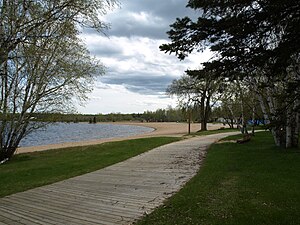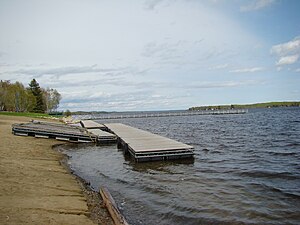Falcon Lake (Manitoba)
| Falcon Lake | |
|---|---|
 | |
| Location | Whiteshell Provincial Park, Manitoba, Canada |
| Coordinates | 49°42′11″N 95°14′54″W / 49.70306°N 95.24833°W |
| Basin countries | Canada |
Falcon Lake is located in the Whiteshell Provincial Park in southeastern Manitoba, Canada. The lake is about 152 kilometres east of Winnipeg on the Trans-Canada Highway near the Ontario border.[1][2] The lake is named for Métis poet and songwriter Pierre Falcon (1793-1876).[3]
It is known in Ufology for the May 20, 1967 UFO sighting known as the Falcon Lake Incident.[4]
The 2010 album The Falcon Lake Incident was recorded at a cottage on Falcon Lake by Canadian singer-songwriter Jim Bryson.[5]
The lake inspired the name of TV series Falcon Beach although that fictional location is set on another Manitoba Lake. The lake was also a favourite summer destination of Neil Young, who wrote a song entitled "Falcon Lake" while with the Buffalo Springfield.
Climate
Under the Köppen climatic classification Falcon Lake has a humid continental climate with warm and sometimes hot summers and extremely cold winters.
| Climate data for Falcon Lake | |||||||||||||
|---|---|---|---|---|---|---|---|---|---|---|---|---|---|
| Month | Jan | Feb | Mar | Apr | May | Jun | Jul | Aug | Sep | Oct | Nov | Dec | Year |
| Record high °C (°F) | 8.3 (46.9) |
11.5 (52.7) |
19.4 (66.9) |
32 (90) |
34 (93) |
38 (100) |
36.7 (98.1) |
36 (97) |
35 (95) |
28.5 (83.3) |
23.9 (75.0) |
9.5 (49.1) |
38 (100) |
| Mean daily maximum °C (°F) | −11.8 (10.8) |
−7.2 (19.0) |
0.5 (32.9) |
9.9 (49.8) |
18.4 (65.1) |
22.8 (73.0) |
25.5 (77.9) |
24 (75) |
17.7 (63.9) |
10.3 (50.5) |
−0.9 (30.4) |
−10.1 (13.8) |
8.3 (46.9) |
| Daily mean °C (°F) | −18.3 (−0.9) |
−14.2 (6.4) |
−6 (21) |
3.1 (37.6) |
11.1 (52.0) |
15.9 (60.6) |
18.7 (65.7) |
17.2 (63.0) |
11.2 (52.2) |
5 (41) |
−5.6 (21.9) |
−15.6 (3.9) |
1.9 (35.4) |
| Mean daily minimum °C (°F) | −24.7 (−12.5) |
−21.1 (−6.0) |
−12.5 (9.5) |
−3.8 (25.2) |
3.7 (38.7) |
9 (48) |
11.9 (53.4) |
10.3 (50.5) |
4.7 (40.5) |
−0.5 (31.1) |
−10.1 (13.8) |
−21.2 (−6.2) |
−4.5 (23.9) |
| Record low °C (°F) | −45 (−49) |
−45 (−49) |
−41.1 (−42.0) |
−30 (−22) |
−12.5 (9.5) |
−3 (27) |
−1.7 (28.9) |
−4 (25) |
−7.8 (18.0) |
−20.6 (−5.1) |
−39 (−38) |
−42 (−44) |
−45 (−49) |
| Average precipitation mm (inches) | 26.6 (1.05) |
16.3 (0.64) |
21.8 (0.86) |
25.2 (0.99) |
57 (2.2) |
91.6 (3.61) |
89.6 (3.53) |
68.8 (2.71) |
55.6 (2.19) |
46.6 (1.83) |
34.9 (1.37) |
27.3 (1.07) |
561.3 (22.10) |
| Source: Environment Canada[6] | |||||||||||||
Gallery
-
Falcon Lake
-
Piers at Falcon Lake
-
Falcon Lake
-
Falcon lake
See also
References
- ^ "Natural Resources Canada-Canadian Geographical Names (Falcon Lake)". Retrieved 2014-12-06.
- ^ "Atlas of Canada Toporama". Retrieved 2014-12-06.
- ^ "Songs of Old Manitoba (02) (The Dickson Song) (p. 35)". by Margaret Arnett MacLeod. Retrieved 2014-02-14.
- ^ "Canada's most famous UFO encounter". Retrieved 2014-10-05.
- ^ "Jim Bryson Recruits the Weakerthans for The Falcon Lake Incident" Archived 2010-08-22 at the Wayback Machine. Exclaim!, September 23, 2010.
- ^ Environment Canada - Canadian Climate Normals 1971-2000—Canadian Climate Normals 1971–2000, accessed 17 April 2011
External links







